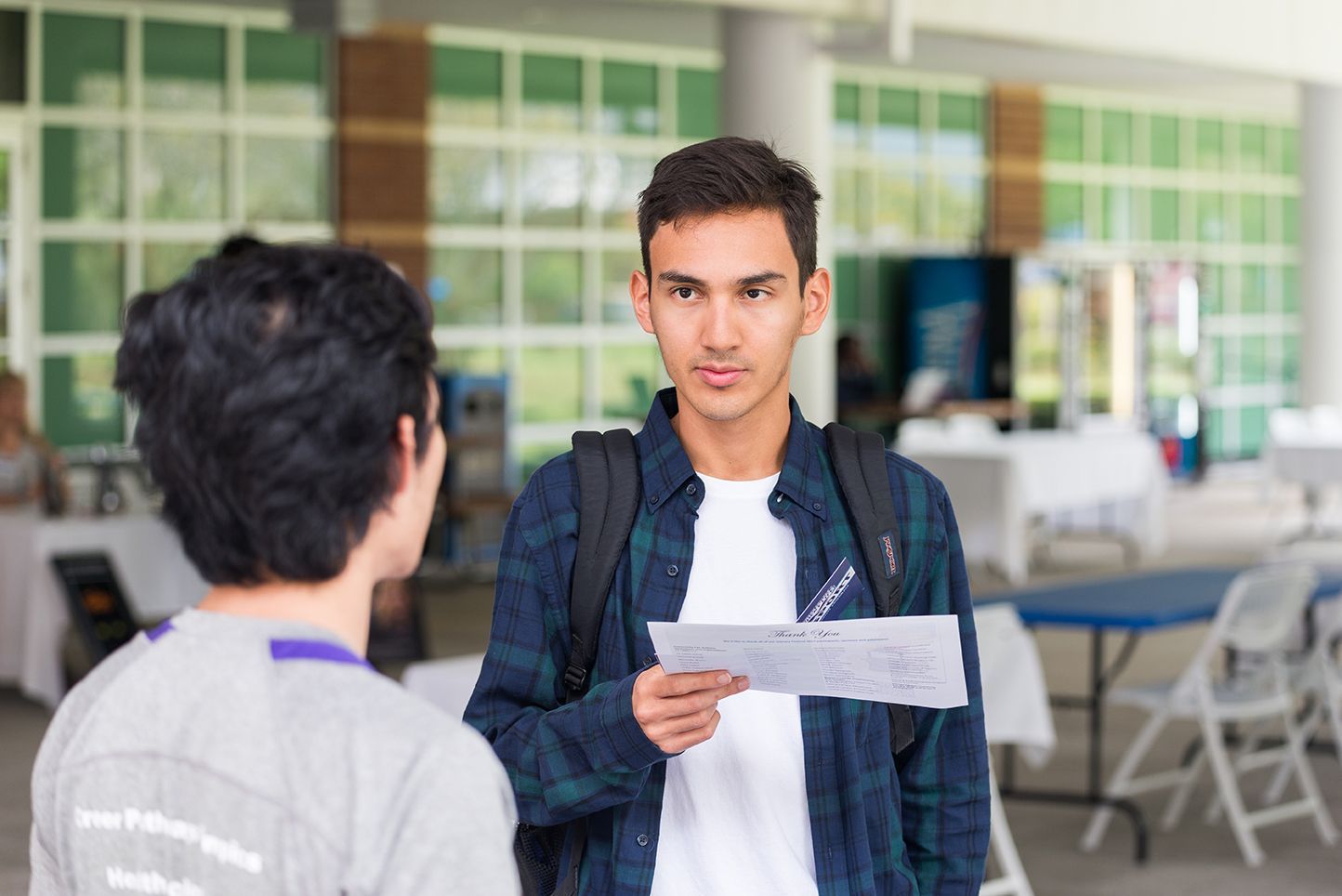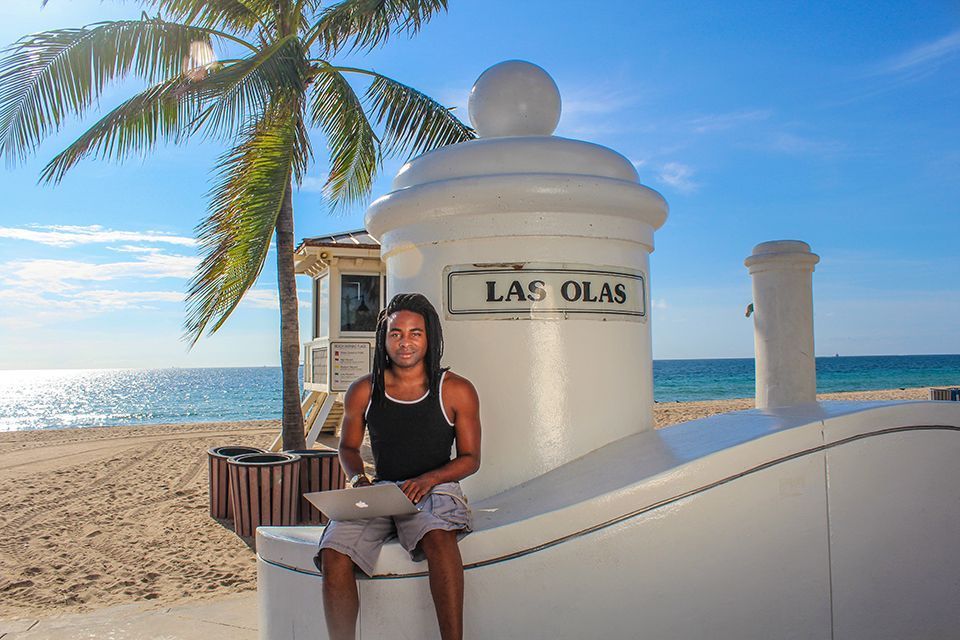Respiratory Care (Respiratory Therapy)
Associate of Science
Accessibility Options: Skip to Content Skip to Search Skip to Footer Institutional Accessibility Open Alternative Formats for this page
Accessibility Options: Skip to Content Skip to Search Skip to Footer Institutional Accessibility Open Alternative Formats for this page
Associate of Science
During COVID-19, most clinical affiliates mandated vaccinations for all students attending clinical externships at off-campus sites. This was a clinical affiliate requirement and not a Broward College requirement, and declining the COVID19 vaccination prevented students from completing their program of study. At this time, clinical affiliates do not have mandatory COVID19 vaccination requirements. Clinical affiliates currently mandate the Flu vaccine and could reinstate the COVID19 vaccination requirements at any time and if so, students will be required to have the COVID19 vaccinate in order to attend clinical rotations, allowing them to progress in their program of study.
Respiratory therapists work with advanced medical equipment such as mechanical ventilators that breathe for people who can't breathe on their own and also work with other devices that require a knowledge of technology. RTs understand how to apply high-tech devices in the care and treatment of patients, how to assess patients to ensure the treatments are working properly, and how to make the changes necessary to arrive at the best outcome for the patient.
The Respiratory Therapy (also called Respiratory Care) program is located on North Campus in Coconut Creek, Florida. Our full-time, two-year program is well-known among the local healthcare community for educating respiratory therapy's brightest minds. Join the hundreds of other former Respiratory Care graduates who have contributed to shaping our outstanding reputation for 50 years.
A Respiratory Therapy degree from Broward College leads you to:
Do you know how much you could earn in this field?
Entry-level Respiratory Therapists in the South Florida area earn an average of $25.00 per hour - $30.00/ hour as base pay. Starting salaries average $51,000 to $62,000 annually. Job outlook and career growth are expected to remain high as aging populations increase.
For the August 2023 Respiratory Care program, students who were admitted had GPAs of 2.8 to 4.0.
Additional programmatic admissions criteria can be reviewed at the Health Science Admissions site.
Here you will find the Respiratory Care Program Student Handbook (PDF).
See a comparison of all respiratory care program outcomes.
The goal of the Broward College Respiratory Care Program is to prepare graduates with demonstrated competence in the cognitive (knowledge), psychomotor (skills), and affective (behavior) learning domains of respiratory care practice as performed by registered respiratory therapists (RRTs)
| Graduation Year | Number of Students that Enrolled in the Program | Number of Students that Graduated | % Attrition | CRT Success | RRT Success | % of Grads Hired as Respiratory Therapists |
|---|---|---|---|---|---|---|
| 2024 | 21 | 13 | 39% | 100% | 100% | 100% |
| 2023 | 20 | 13 | 35% | 100% | 100% | 100% |
| 2022 | 17 | 11 | 39% | 100% | 100% | 100% |
| 2021 | 25 | 17 | 32% | 100% | 100% | 100% |
| 2020 | 25 | 17 | 32% | 100% | 100% | 89% |
Respiratory Care students at Broward College have a state-of-the-art facility filled with the latest in equipment and technology for their training grounds. When you join the program, your experience begins and ends with an abundance of hands-on opportunities. In addition to your experience at the hospitals, the Health Science Simulation Center provides a virtual hospital opportunity where you spend about 72 hours during the program practicing more than 20 live simulations that prepare you for your career.
The first semester in the Respiratory Care program is two days a week. The remaining semesters are four days a week. All academic courses take place during the day. Clinical Rotations are offered during the day from 6:45 a.m. until 3:15 p.m. and during the evening from 2:45 p.m. until 11:15 p.m.
The program requires a lot of dedication to classroom work and study time. It is difficult to work full-time hours and perform well academically.
Class sizes are small and your peers are sure to demonstrate the same eagerness to learn and helpfulness that we enjoy seeing from all of our students.
The combination of lectures, lab courses, clinical courses, and the vast knowledge of the faculty create an atmosphere of constant engagement between the student and the course material. Open lab hours and scheduled tutoring sessions are provided for an optimal learning experience.
Our dedicated faculty will prepare you for a career in respiratory therapy by showing you how to:
*Policies apply to all students and faculty regardless of the location where instruction occurs.
Before making any decision about which respiratory care program to enroll in, it's important to make sure that this career is a good fit for you. Some of the qualities you should possess include:
Upon graduating and earning your license, your duties as a respiratory therapist will include:
It takes 76 credit hours to earn your A.S. in Respiratory Care, which takes two years to complete with a full-time schedule. Part-time courses are not available.
General education courses for admission to the program can be taken at all Broward College campuses. All Respiratory Care labs and lecture courses are located on the North Campus in Coconut Creek, Florida.
See all Respiratory Care course descriptions
First Semester: Respiratory classes are from approximately 9 a.m. to 3 p.m. on Tuesday and Thursday. Lab sessions (RET1026L) are limited to ten students so the schedule will depend on the lab session that you choose.
Second Semester: Respiratory classes take place on Monday from 9:30 a.m. until 5 p.m. and Thursday from 9 a.m. until 5 p.m. Times on Thursday are approximate depending on the lab session that you choose.
Clinical rotations at the hospital begin the second semester of the program on Wednesday and Friday. You will need to purchase hospital scrubs and a stethoscope. The clinical coordinator will advise you of the color and types of items to purchase.
During your clinical rotations, paid clinical instructors to stay with you and provide the expertise you need for proper training as a respiratory therapist. Your rotations include non-critical areas, intensive care areas for adults, pediatrics, and neonates, emergency room training, pulmonary function testing, and long-term care facility rotations. In addition, you will have opportunities to explore specialties like sleep medicine and pulmonary rehabilitation. You will be taught the competencies you need to independently function as a respiratory therapist when you graduate and become employed as an RRT.
The times are on Wednesday and Friday from 6:45 a.m. until 3:15 p.m. Afternoon clinicals are from 2:45 p.m. until 11:15 p.m. when available.
Third Semester (Six weeks): Respiratory class meets on Tuesdays from 10 a.m. until 3 p.m. The clinical rotations at the hospital are on Wednesday and Friday from 6:45 a.m. until 3:15 p.m. and afternoons from 2:45 p.m. until 11:15 p.m. when available.
First Semester: Respiratory classes meet on Monday from 9 a.m. until 6 p.m. and on Tuesday from 9 a.m. until 3 p.m. The clinical rotations are on Wednesday and Friday from 6:45 a.m. until 3:15 p.m.
Final Semester: Respiratory classes meet on Tuesday from 9 a.m. until 12 p.m. The clinical rotations at the hospital are on Wednesday and Friday from 6:45 a.m. until 3:15 p.m.
During the final semester of your second year, intensive training takes place to prepare you for the national exams. A seminar is scheduled, and practice questions and simulations are part of the preparation. Before graduating from the program, an exit exam must be passed. The exam is given by the National Board for Respiratory Care to all students graduating from a respiratory therapy program. Students also become certified in ACLS (advanced cardiac life support) before graduation.
After graduation from the program, the cost of becoming a registered respiratory therapist who can practice in the State of Florida is approximately $550 including the exams and the State of Florida license. The first exam can be taken within a week of graduating from the program.
In choosing a career in Respiratory Therapy, you will be directly involved with the health of other human beings. Professional attire and personal grooming are important, not only to the respiratory profession but to the public as well. You will be a representative of the respiratory team and must be an example to those with whom you come in contact. Therefore, regulations about uniforms and personal grooming are necessary and are to be followed.
Auditing passed courses is recommended. The program should ensure that any student who progresses in the program and is eventually assigned to a clinical rotation has demonstrated sufficient academic knowledge as well as competency in the skills that will be required in the clinical arena. A student repeating a respiratory course will be asked to audit some of the respiratory courses already passed in the same year as the failed course.*** All students must be aware that if they are receiving Financial Aid, these audited courses will not be included in the financial aid package. The student must pay the full cost of the course including any fees that are part of the course.
***Auditing an already passed respiratory care course: The audited course must be successfully repeated (grade of 'C' or higher) to continue in the respiratory program or re-entry exams must be successfully taken.
An excellent clinical experience is in store for you while enrolled in BC's Respiratory Care Program. Highly trained clinical instructors stay with you and guide your learning process as you become well-trained as a respiratory therapist.
Respiratory therapists with associate's degrees have excellent job prospects today and in the future. Job growth in respiratory care is expected to increase for the next decade, with a 28 percent growth rate nationwide, according to the Bureau of Labor Statistics. Most hospitals offer 12-hour work shifts with three days a week being considered full-time. The starting pay is approximately $24.00-$30.00/hour for registered respiratory therapists. Job openings exist throughout the tri-county area as well as throughout the country. Because of the quality and reputation of our graduates, over 90% of our graduates have found employment. The respiratory care profession is a strong profession with a secure future. Currently, there are over 160,000 practicing respiratory therapists in the United States.
See the Career Path for Respiratory Therapists
American Association for Respiratory Care's overview of the RT profession
Broward College's degree program satisfies the requirements established by the National Board for Respiratory Care and qualifies you as a candidate for the National Respiratory Therapist Multiple-Choice Examination, and the Clinical Simulation Examination.
The Broward College Respiratory Care program includes extensive preparation for national certification exams as well as resume and interview preparation.
Upon obtaining their licenses, 90% to 100% percent of our graduates have been hired as respiratory therapists in healthcare settings such as:
Because of the variation in the curriculum from one program to the next, it is recommended that the students finish the respiratory care program where they originally attended. Transferring to another school may require a longer time to complete all of the respiratory courses.
Students applying to Broward College (BC) from other respiratory programs are accepted according to the following criteria:
The exam has three portions:
Practicing respiratory therapists with a CRT credential who desire to acquire an RRT credential can do so without having to be admitted into an advanced-level respiratory therapy program.
All that is needed is to meet the National Board for Respiratory Care requirements to sit for the registry exam. Please refer to the NBRC handbook for more information.
Upon completion of your degree, you qualify as a candidate for the National Board of Respiratory Care Credentialing Exams. There are two exams:
Once you are RRT eligible, you qualify to take the Clinical Simulation exam. Upon successful completion, you become a Registered Respiratory Therapist.
Our graduates have an excellent pass rate on the national exams. The pass rate is above the national average on both exams.
Obtaining a Florida License
After passing one or both national exams, you will be eligible to apply for a respiratory care license from the state of Florida. You will then be ready to seek employment.
Any person who wishes to determine the eligibility for state licensure and has been arrested or convicted of any offense other than a minor traffic violation should contact:
The Department of Health
Board of Respiratory Care
4052 Bald Cypress Way; BinC05
Tallahassee, FL 32399-3255
Maintain Your License
Please keep in mind that the Florida license needs to be renewed every two years (on the odd year). To renew the license, you must accumulate continuing education units (CEU). Twenty-four are required every two years. The CEU is offered by:
Making Every Breath Count: Broward College's Respiratory Care Program
American Association for Respiratory Care
This is the official site of the national association. It is loaded with lots of respiratory events, information on a career, other web-related links, and how to sign up as a member.
Florida Society for Respiratory Care
The state society keeps you posted on issues in the state, and continuing education seminars and allows you to sign up as a member.
Florida Board of Respiratory Care
Gives you instructions on obtaining your license to practice respiratory care, describes the laws and rules of the profession, includes the rules for continuing education hours, and lists all licensed respiratory therapists in the state of Florida.
National Board for Respiratory Care
The national board creates the national exams and monitors the administration of the exams. You will apply to the NBRC to take your Therapist Multiple Choice (TMC) and Clinical Simulation exams.
Commission on Accreditation for Respiratory Care
CoARC accredits respiratory therapy education programs in the United States. To achieve this end, it utilizes an 'outcomes-based' process. Programmatic outcomes are performance indicators that reflect the extent to which the educational goals of the program are achieved and by which program effectiveness is documented.
Health Science Admissions
healthscience@broward.edu
Health Science Advisor
Marilyn Rule
Mrulehei@broward.edu
Program Director
Jay Wimberly MHA, RRT
Jwimber1@broward.edu
Director of Clinical Education/Complio
Baig, Fareeza
fbaig@broward.edu
Adjunct Faculty
Farini, Patty
pcoelho@broward.edu
Krickemeyer, Krystine
kkrickem@broward.edu
Riera, Alex
ariera@broward.edu
Shapiro, Brian
bshapir1@broward.edu
BROWARD COLLEGE SACSCOC ACCREDITATION STATEMENT
Broward College is accredited by the Southern Association of Colleges and Schools Commission on Colleges (SACSCOC) to award Associate in Arts, Associate in Science, Associate in Applied Science, Bachelor of Science, and Bachelor of Applied Science degrees. Broward College also may offer credentials such as certificates and diplomas at approved degree levels. Questions about the accreditation of Broward College may be directed in writing to the Southern Association of Colleges and Schools Commission on Colleges at 1866 Southern Lane, Decatur, GA 30033-4097, by calling 404-679-4500, or by using information available on SACSCOC's website (www.sacscoc.org).
The Respiratory Care Program is nationally accredited by the Commission on Accreditation for Respiratory Care.
CoARC Address: 264 Precision Blvd, Telford, TN 37690
Program Name: Respiratory Care
Program Number: 200079
Degree Awarded: AS Degree
Campus Location:
1000 Coconut Creek Blvd.
Coconut Creek, FL 33066
Accreditation Status: Continuing Accreditation
CoARC Standard 5.03 for entry standards: "CoARC accredits respiratory therapy education programs in the United States. To achieve this end, it utilizes an 'outcomes based' process. Programmatic outcomes are performance indicators that reflect the extent to which the educational goals of the program are achieved and by which program effectiveness is documented."
Broward College Health Science Admissions staff may be contacted by email at healthscience@broward.edu.
North Campus
Building 46 | Room 252
1000 Coconut Creek Blvd.
Coconut Creek, FL 33066
Central Campus
Building 8 | Room 130
3501 Davie Road
Davie, FL 33314

Applying for aid is not difficult, but the application does take some focused time. The rewards are worth it. These funds can change your life.

Unlike loans, you do not have to pay scholarship money back. Broward College has limited scholarships for merit, financial need, degree choice, and more.

A BC degree checks all the boxes. If this program is your goal, get started toward becoming a student today.
This site is best viewed in a modern browser and is not compatible with Internet Explorer (IE). Please use another browser, such Chrome, Safari, Edge, or Firefox for the best user experience.